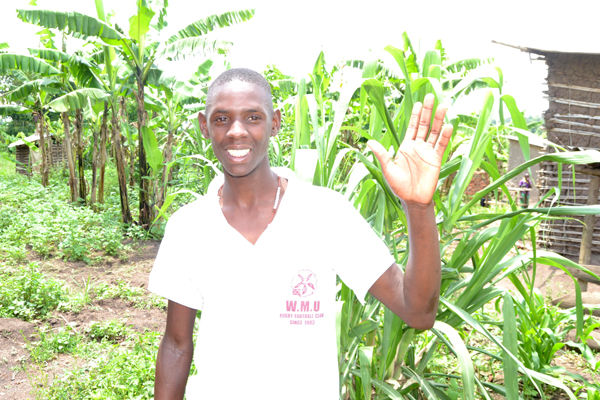Prime
My Ebola Story: Ssebayiga lost 10 acres of crops after falling ill

Alex Ssebayiga, one of the first Ebola recovery cases, at his home in Mubende District. PHOTO/DAN WANDERA
What you need to know:
- On January 11, the government declared an end to the Ebola virus outbreak that had emerged four months earlier and claimed 55 lives. In this 16th installment of our series, Alex Ssebayiga, one of the 87 Ebola Virus Disease survivors, shares his depressing experience.
Disease and calamity always bring about socio-economic setbacks when they strike a particular community.
Alex Ssebayiga, one of the 87 Ebola Virus Disease survivors, went through a depressing experience after losing more than 10 acres of crops.
Ssebayiga, 26, a farmer and resident of Kisamula Parish, Lulongo Village in Madudu Sub-county, Mubende District, had planted maize, Irish potatoes and beans on a piece of land that measured about 14 acres shortly before he was diagnosed with Ebola.
Because he employed part time casual labourers, his hopes of harvesting crops and making a good amount of money were dashed by Ebola that confined him to the hospital bed at the Mubende Ebola treatment unit.
Ssebayiga had planted maize on seven acres, Irish potatoes on two acres, and beans on two acres but disaster struck shortly before the first weeding of the gardens could be done.
He had planned to harvest in early December 2022 but failed to get the first weeding done and application of fertilizers and pesticide, as he was both the manager and financier of the farm projects. The Ebola outbreak that was accompanied with a lockdown complicated any attempt for any of the farm labourers to attend to the gardens in his absence.
Ssebayiga was welcomed by bushy gardens and rodents that feasted on some of the crops when he set foot at the gardens after his discharge from hospital.
“I rent the land on which I carry out the farming but I suffered losses in the year 2022. Luckily I survived the Ebola disease that almost took my life. I had to clear the bush and plan for the next season after the big loss,” he says.
Asked why his wife never took over the farm projects, Ssebayiga reveals that she and their child were among the Ebola virus disease contact persons that were monitored for 21 days. Luckily, they did not contract the disease.
Ssebayiga had started the farming business in 2017 and had begun to see some progress in the farming projects. He had hoped to harvest more than 100 bags of maize at the end of the season but this did not happen.
Back home in Madudu Sub-county at the beginning of September 2022, Ssebayiga had a sister with an eight-year old child that fell sick. The family was divided about the kind of illness, choosing to visit the health centre but at the same time, a traditional healer .
It was during this time that Ssebayiga chose to ride the motorcycle to ensure that the life of the eight-year-old was saved. Two days after receiving treatment, the girl started bleeding from the nose, had diarrhoea and was vomiting. He decided that the little girl should be shifted to Mubende Regional Referral Hospital where she was admitted. At this time, the mother of the girl was also very sick but getting treatment from home.
“The little girl succumbed to the unknown illness at Mubende. I decided to transport the body from hospital to the burial place in Kyegegwa,” Ssebayiga says. The distance was about 33kms from Mubende District. This was more than two weeks before the government declared the country had an Ebola virus disease outbreak.
Shortly after, Ssebayiga recalls that some of the family members that participated in the nursing and burial of the child fell sick.
“They complained about severe headache, joint body pains and difficulty in breathing. This was strange but the quickest solution was to consult the traditional healers,” he recalls.
At this time the Ministry of Health declared the outbreak of Ebola in Mubende on September 20, 2022. Back at home, Ssebayiga felt uneasy after realising he too had general body weakness and difficulty in breathing. He realised that these were among the many symptoms linked to Ebola. Ssebayiga decided to visit Mubende hospital with his wife and child.
On September 22, his test results turned positive for Ebola. He was quickly evacuated to the treatment unit without knowing the fate of his wife and child.
This worried him a lot as he battled the sickness. He only leant about their fate when a team from the hospital under the counseling department visited the ward. “I was informed that my wife and child were at home and safe. They were not among the Ebola virus disease victims at the ward. This news brought me so much relief,” he revealed.
At the patient ward, he says that several patients developed mental disorders.
“I also encountered the bad dreams and got scared each time I witnessed fellow patients fight for their lives. At one time, a patient jumped off his bed and undressed before falling on the floor,” he recalls.
One thing that Ssebayiga greatly appreciates is the care and love that the nurses displayed in the absence of the caregivers. “We were given fruits, food and juice to drink. Though the patients were without their caregivers, the medical teams were available to treat and offer comfort to the patients,” he says.
On October 1, Ssebayiga was among the first recovery Ebola cases to get discharged from the date government declared the outbreak on September 22.
Ssebayiga says he returned home to find a deserted house and nearby residents fearful of coming to his home. For the first time, he saw the neighbours waving to him from a distance and avoiding talking to him.
“The shop attendants were afraid of touching the money and offered the goods for free,” Ssebayiga reveals.
Things got better, eventually. The health teams carried out a sensitisation programme against stigma and there was a positive impact. Ssebayiga reveals that several organisations have joined the sensitisation programme to ensure that the Ebola survivors and families that lost their dear ones are not discriminated against.





